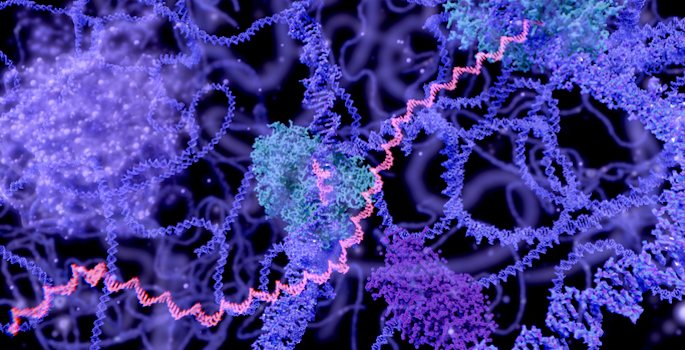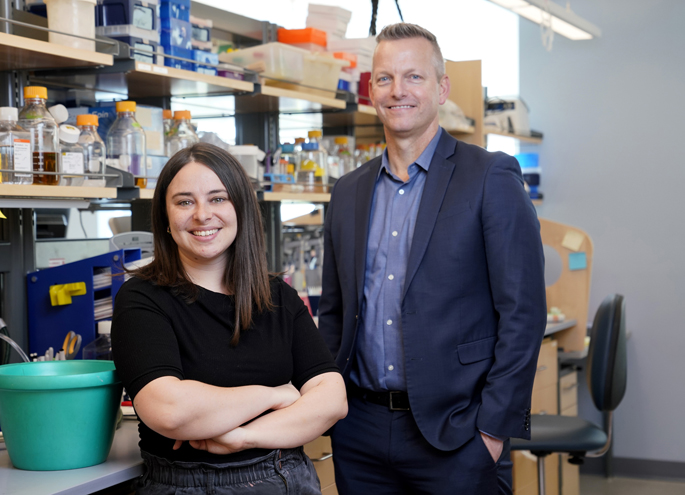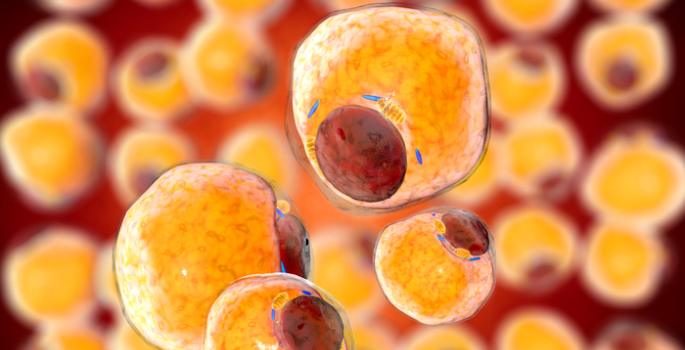NIAID
-

Study details RNA editing in virus-infected cancer cells
Vanderbilt researchers detail the landscape of RNA editing — a form of RNA modification — in primary effusion lymphoma cells during Kaposi’s sarcoma-associated herpesvirus infection and identify an edited viral microRNA that is critical for infection. Read MoreApr 20, 2023
-

Study identifies key player in T cell “education”
New Vanderbilt research could inform therapeutic strategies for enhancing thymic function when desired — such as during aging, recovery from radiation therapy or chemotherapy, or other conditions that reduce T cell output. Read MoreSep 1, 2022
-

Study describes how E. coli co-opts cells, causes recurrent UTIs
Researchers at Vanderbilt University Medical Center have discovered why the uropathogenic bacterium E. coli, the leading cause of urinary tract infections, is so tenacious; their findings could lead to new ways to prevent recurrent UTIs. Read MoreAug 25, 2022
-

Study identifies first cellular “chaperone” for zinc, sheds light on worldwide public health problem of zinc deficiency
A team led by Vanderbilt researchers has described and characterized the first zinc metallochaperone: a protein that puts zinc into other “client” proteins. Read MoreMay 17, 2022
-

VUMC team discovers how bacterial pathogen survives without water
Vanderbilt researchers are studying a bacterial pathogen that can survive on hospital surfaces — without water — for months, an ability that has helped it become a leading cause of hospital-acquired infections. Read MoreMay 5, 2022
-

Study advances understanding of bacterial bioterrorism agent
Vanderbilt researchers have identified a critical regulatory factor in the bacterium that causes the disease anthrax and has been used as a biological weapon. Read MoreApr 7, 2022
-

Invasive strep can defy zinc toxicity
Vanderbilt researchers find that invasive Group B Streptococcus strains, a significant risk to pregnant patients and infants, can grow in presence of toxic zinc levels. Read MoreFeb 28, 2022
-

Impaired neutrophils in autoimmunity
Vanderbilt researchers help answer the question of why patients with autoimmune diseases like lupus are more susceptible to bacterial infections: their neutrophils have impaired antibacterial activity. Read MoreJan 27, 2022
-

H. pylori, lipid loss and stomach cancer
H. pylori infection — a strong risk factor for stomach cancer — changes the composition of stomach lipids, which could offer new biomarkers for detecting premalignant changes, Vanderbilt researchers discovered. Read MoreJan 17, 2022
-

Salmonella overcomes host resistance
The invading pathogen Salmonella, a common cause of food poisoning, can change its metabolism to overcome host resistance to its colonization. Read MoreJan 13, 2022
-

‘Pre-conditioning’ restores immune tolerance
A treatment targeting T-cell metabolism could reinvigorate immune tolerance mechanisms to combat autoimmune disease and transplant rejection, Vanderbilt researchers discovered. Read MoreSep 16, 2021
-

Establishing HIV care in Tennessee
Vanderbilt researchers find that heterosexually active Black males are the least likely to establish HIV care within one month of diagnosis and suggest that targeted interventions focus on this population. Read MoreJul 13, 2021
-

HIV, diabetes and immune cells in fat
In HIV-positive individuals with diabetes, immune cells in fat are more proinflammatory and cytotoxic and may represent a therapeutic target for diabetes. Read MoreMar 18, 2021
-

Key factors in HIV-1 replication
HIV-1, the virus that causes AIDS, exploits inositol phosphates in T cells to aid its own assembly and maturation — suggesting that targeting inositol phosphate binding could inhibit HIV-1 replication. Read MoreFeb 8, 2021
-

Exploiting viral vulnerabilities
The isolation of human monoclonal antibodies against dangerous viruses including EEEV, Hendra and Nipah could offer new ways to treat and prevent these infections. Read MoreDec 10, 2020
-

Study details early events of inflammatory response
Vanderbilt University Medical Center investigators have identified a key molecular player in the early events of the inflammatory response to infection. The findings suggest new therapeutic possibilities for enhancing the inflammatory response to protect against pathogens and for blocking inflammation gone awry in diseases like arthritis and atherosclerosis. Read MoreDec 10, 2020
-

VUMC begins study of second COVID-19 vaccine
Vanderbilt University Medical Center has begun recruiting up to 250 participants for a Phase 3 clinical trial testing an investigational COVID-19 vaccine candidate developed by the Janssen Pharmaceutical Companies of Johnson & Johnson. Read MoreNov 2, 2020
-

Preserving gut mucus architecture
A new method that keeps microbes and gut cells together will be useful for studies of complex host-microbe interactions and for analysis of clinical specimens. Read MoreOct 20, 2020
-

Early steps in reovirus replication
Conformational change in a reovirus surface protein modulate the virus’s attachment to host cells, Vanderbilt researchers have found. Read MoreOct 6, 2020
-

Rational vaccine design
Understanding immunity generated by smallpox vaccine may hold lessons for COVID-19 vaccine development. Read MoreSep 22, 2020